Demolition Contractors Eccleshall
Find Demolition Contractors Near Me in Eccleshall
Receive multiple Demolition Contractor quotes for your project today! Compare profiles, reviews, accreditations, portfolio, etc... and choose the best deal.

Steven Bray Construction Ltd.
513 reviews10 Woodlands Close, Hailsham, East Sussex, BN27 1ET, GBAbout Bray Construction Established in 2008, Steven Bray Construction has built a strong reputation as one of East Sussex's leading residential building construction companies. We are fully licensed and insured to provide our services for any and all types of construction and building work. We are committed to providing our clients with the highest quality workmanship and customer service. We always work with pride and integrity, and we strive to keep our commitment to work within specified timeframes and budgets at all times. If you are looking for a skilled builder focused on honesty, integrity, fantastic communication, extreme attention to detail and who stands behind their work then call Steve! We are based in Hailsham and cover all areas of East Sussex including (but not limited to) Eastbourne, Uckfield, Hastings, Bexhill, Robertsbridge, Tunbridge Wells, Battle, Heathfield, Rye, Wadhurst and Lewes. Bray Construction Ltd is a FENSA Approved Installer which means that once the work is completed you will receive a FENSA certificate; this shows proof that your installation complies with all building regulations, is energy efficient, is registered with your local council, and verifies that our warranty is insured. www.fensa.org.uk
- Services
- Why Us?
- Testimonials
- Gallery
Get Quote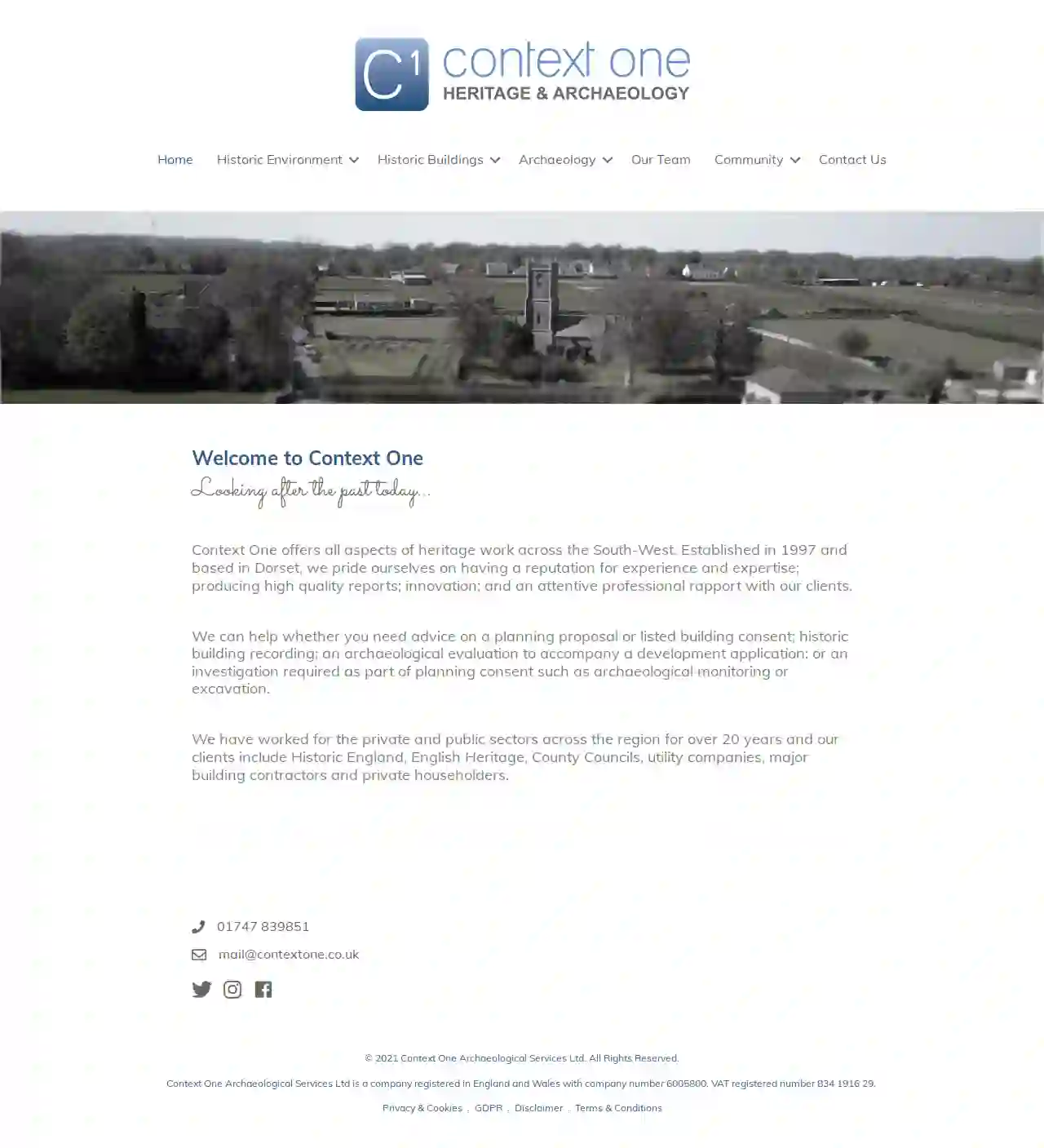
Context One Heritage & Archaeology
51 reviewsStone, GBWelcome to Context One Looking after the past today... Context One offers all aspects of heritage work across the South-West. Established in 1997 and based in Dorset, we pride ourselves on having a reputation for experience and expertise; producing high quality reports; innovation; and an attentive professional rapport with our clients. We can help whether you need advice on a planning proposal or listed building consent; historic building recording; an archaeological evaluation to accompany a development application; or an investigation required as part of planning consent such as archaeological monitoring or excavation. We have worked for the private and public sectors across the region for over 20 years and our clients include Historic England, English Heritage, County Councils, utility companies, major building contractors and private householders.
- Services
- Why Us?
- Gallery
Get Quote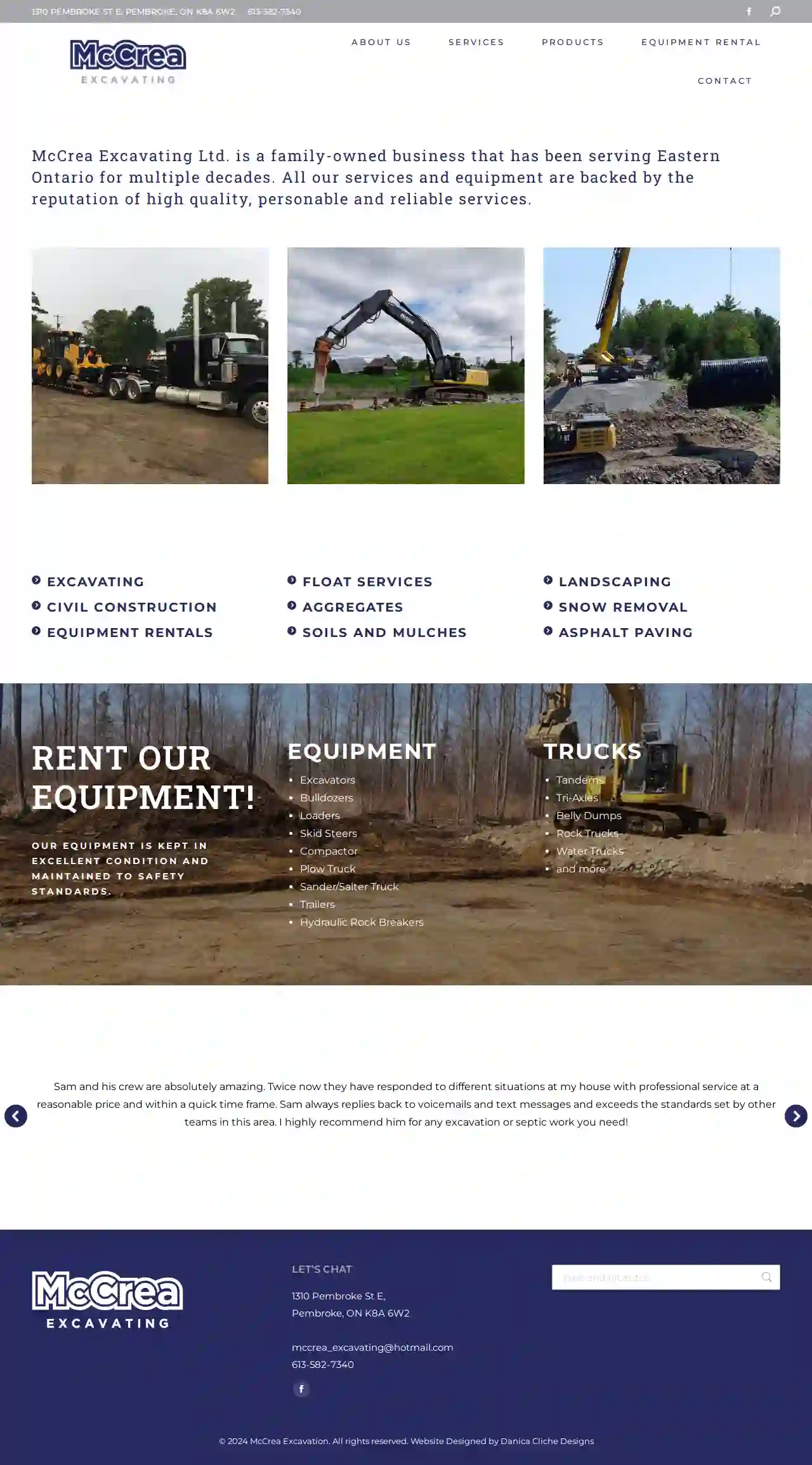
McCrea Excavating Ltd
4.418 reviews1310 PEMBROKE ST E, Pembroke, K8A 6W2, GBAbout Us McCrea Excavating Ltd. is a family-owned business that has been serving Eastern Ontario for multiple decades. All our services and equipment are backed by the reputation of high quality, personable and reliable services.
- Services
- Why Us?
- Testimonials
- Gallery
Get Quote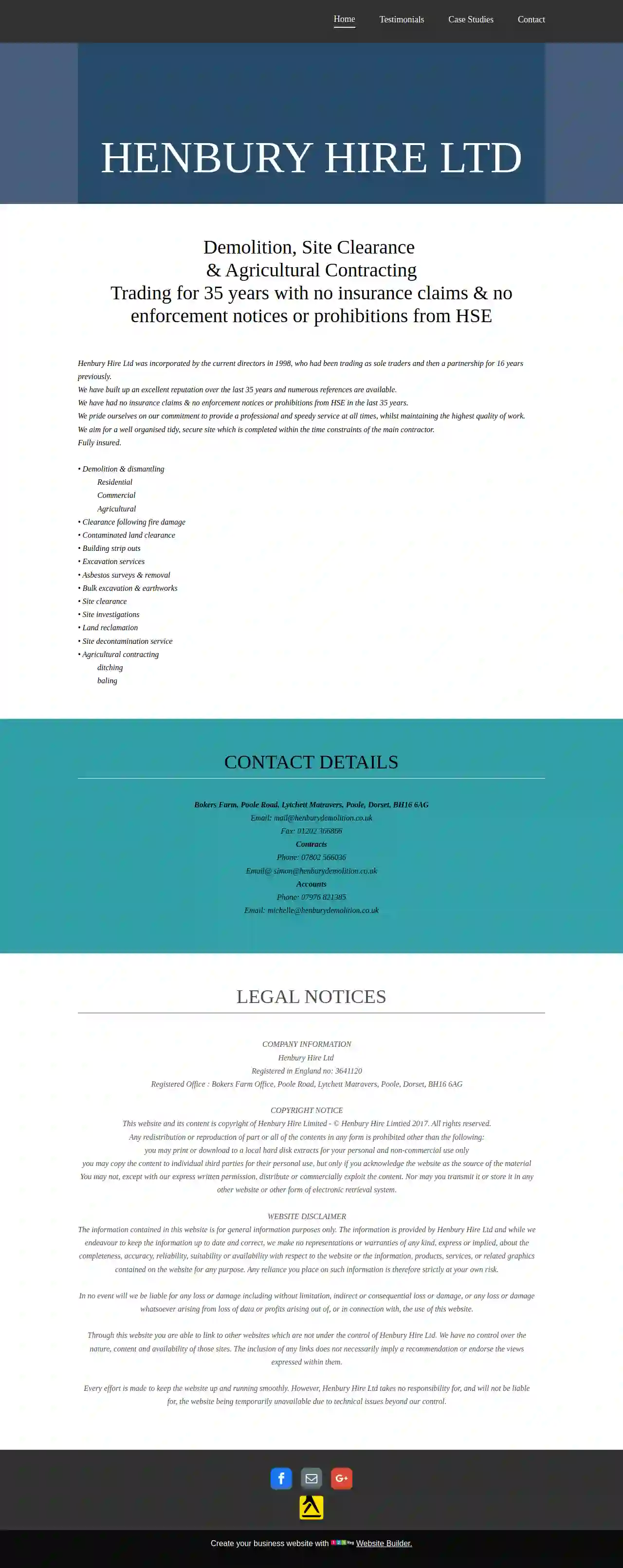
Henbury Hire Ltd
51 reviewsBokers Farm, Poole Road, Lytchett Matravers, Poole, Dorset, BH16 6AG, GBHenbury Hire Ltd Henbury Hire Ltd was incorporated by the current directors in 1998, who had been trading as sole traders and then a partnership for 16 years previously. We have built up an excellent reputation over the last 35 years and numerous references are available. We have had no insurance claims & no enforcement notices or prohibitions from HSE in the last 35 years. We pride ourselves on our commitment to provide a professional and speedy service at all times, whilst maintaining the highest quality of work. We aim for a well organised tidy, secure site which is completed within the time constraints of the main contractor. Services Offered Demolition & dismantling Residential Commercial Agricultural Clearance following fire damage Contaminated land clearance Building strip outs Excavation services Asbestos surveys & removal Bulk excavation & earthworks Site clearance Site investigations Land reclamation Site decontamination service Agricultural contracting ditching baling
- Services
- Why Us?
- Gallery
Get Quote
We Excavate It
Stone, GBAbout We Excavate it We cover many aspects of excavation and groundwork, no job is too small. Feel free to give us a call regarding your excavator needs. We pride ourselves on customer satisfaction from start to finish.
- Services
- Why Us?
- Gallery
Get Quote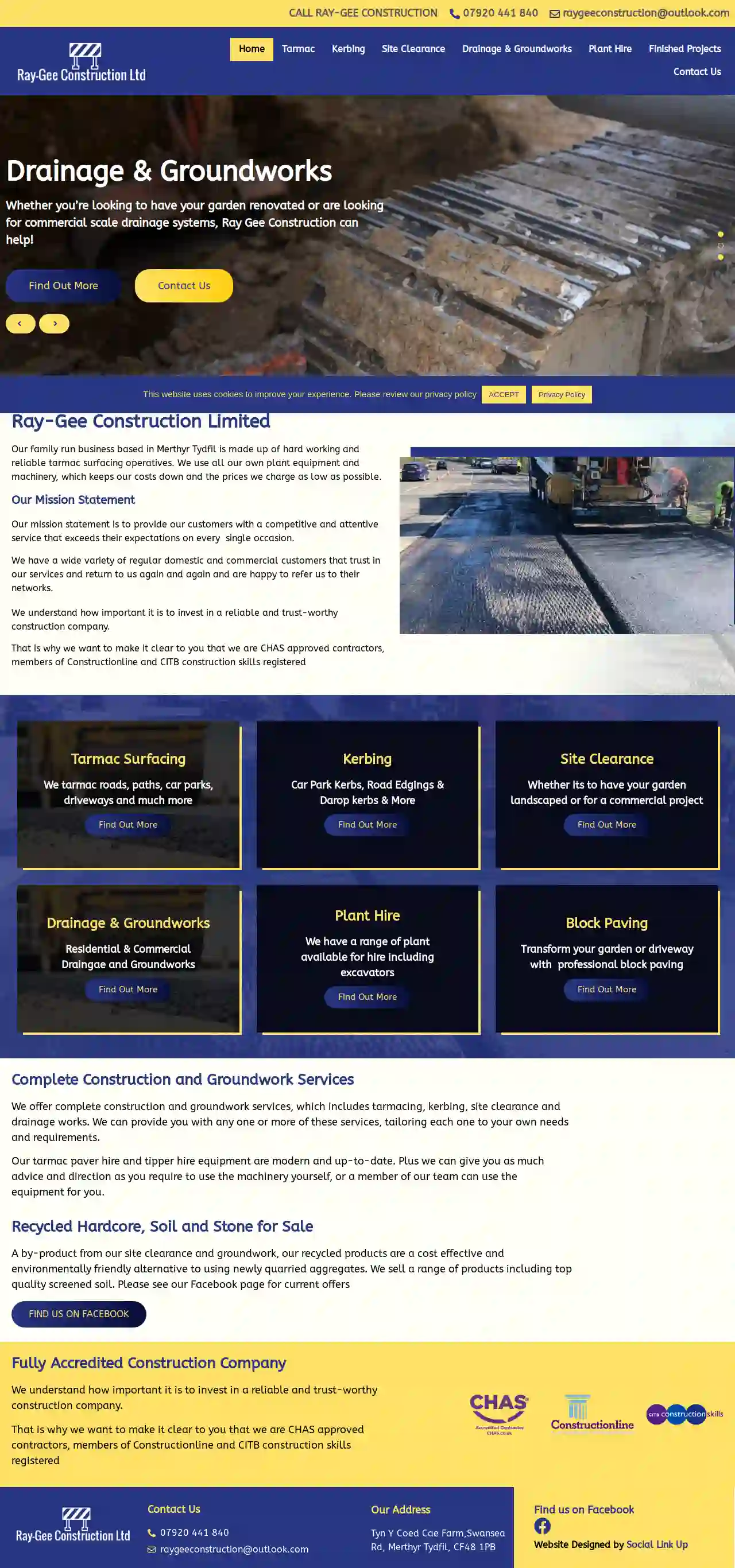
Ray-Gee Construction Limited
Tyn Y Coed Cae Farm, Swansea Rd, Merthyr Tydfil, CF48 1PB, GBRay-Gee Construction Limited Our family run business based in Merthyr Tydfil is made up of hard working and reliable tarmac surfacing operatives. We use all our own plant equipment and machinery, which keeps our costs down and the prices we charge as low as possible. Our Mission Statement Our mission statement is to provide our customers with a competitive and attentive service that exceeds their expectations on every single occasion.We have a wide variety of regular domestic and commercial customers that trust in our services and return to us again and again and are happy to refer us to their networks. Fully Accredited Construction Company We understand how important it is to invest in a reliable and trust-worthy construction company.That is why we want to make it clear to you that we are CHAS approved contractors, members of Constructionline and CITB construction skills registered
- Services
- Why Us?
- Gallery
Get Quote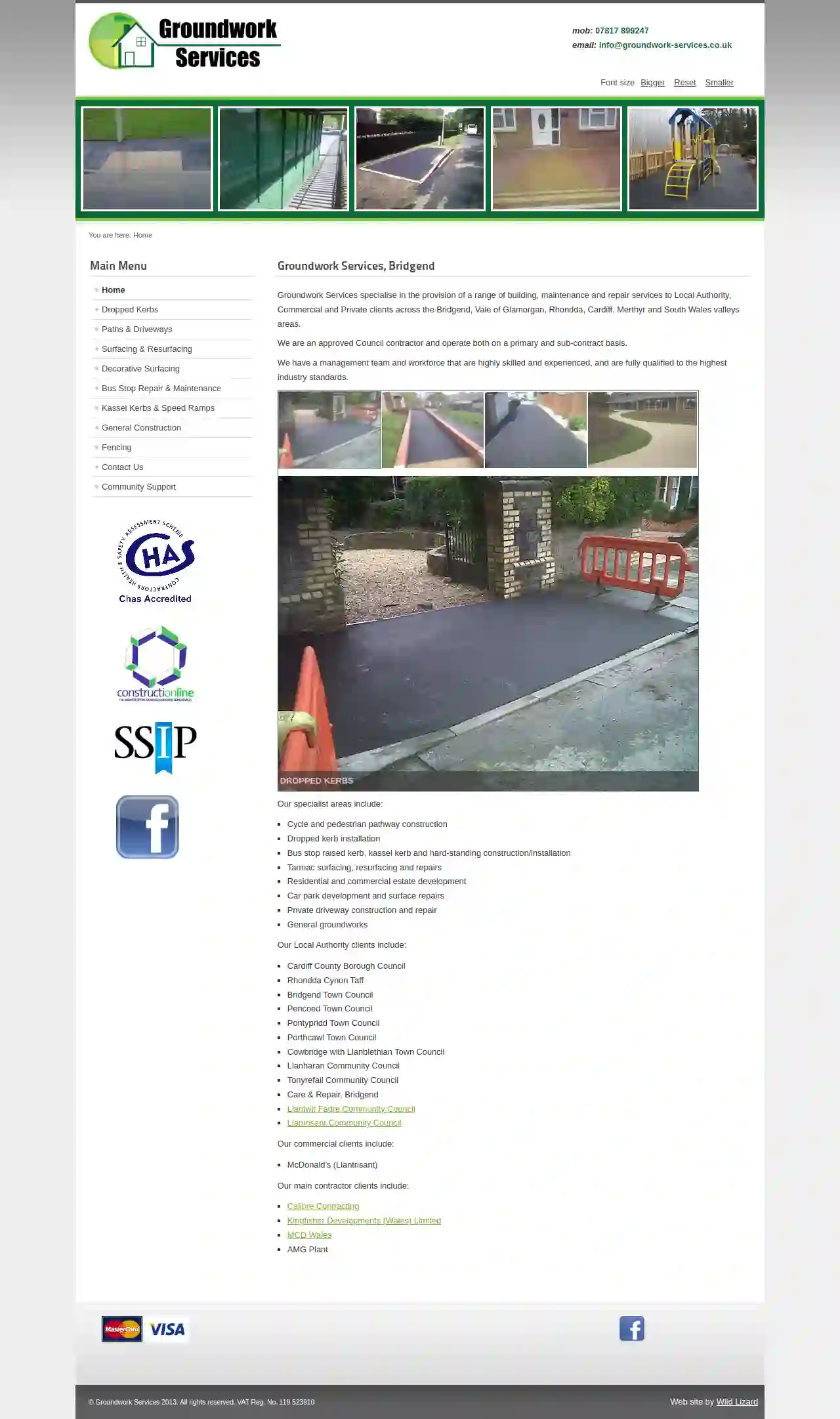
Groundwork Services
44 reviews89 Old Field Road, Bridgend, CF35 5LJ, GBGroundwork Services, Bridgend Groundwork Services specialize in providing a range of building, maintenance, and repair services to Local Authority, Commercial, and Private clients across the Bridgend, Vale of Glamorgan, Rhondda, Cardiff, Merthyr, and South Wales valleys areas. We are an approved Council contractor and operate both on a primary and sub-contract basis. We have a management team and workforce that are highly skilled and experienced, and are fully qualified to the highest industry standards. Our specialist areas include: Cycle and pedestrian pathway construction Dropped kerb installation Bus stop raised kerb, kassel kerb, and hard-standing construction/installation Tarmac surfacing, resurfacing, and repairs Residential and commercial estate development Car park development and surface repairs Private driveway construction and repair General groundworks Our Local Authority clients include: Cardiff County Borough Council Rhondda Cynon Taff Bridgend Town Council Pencoed Town Council Pontypridd Town Council Porthcawl Town Council Cowbridge with Llanblethian Town Council Llanharan Community Council Tonyrefail Community Council Care & Repair, Bridgend Llantwit Fadre Community Council Llantrisant Community Council Our commercial clients include: McDonald's (Llantrisant) Our main contractor clients include: Calibre Contracting Kingfisher Developments (Wales) Limited MCD Wales AMG Plant
- Services
- Why Us?
- Gallery
Get Quote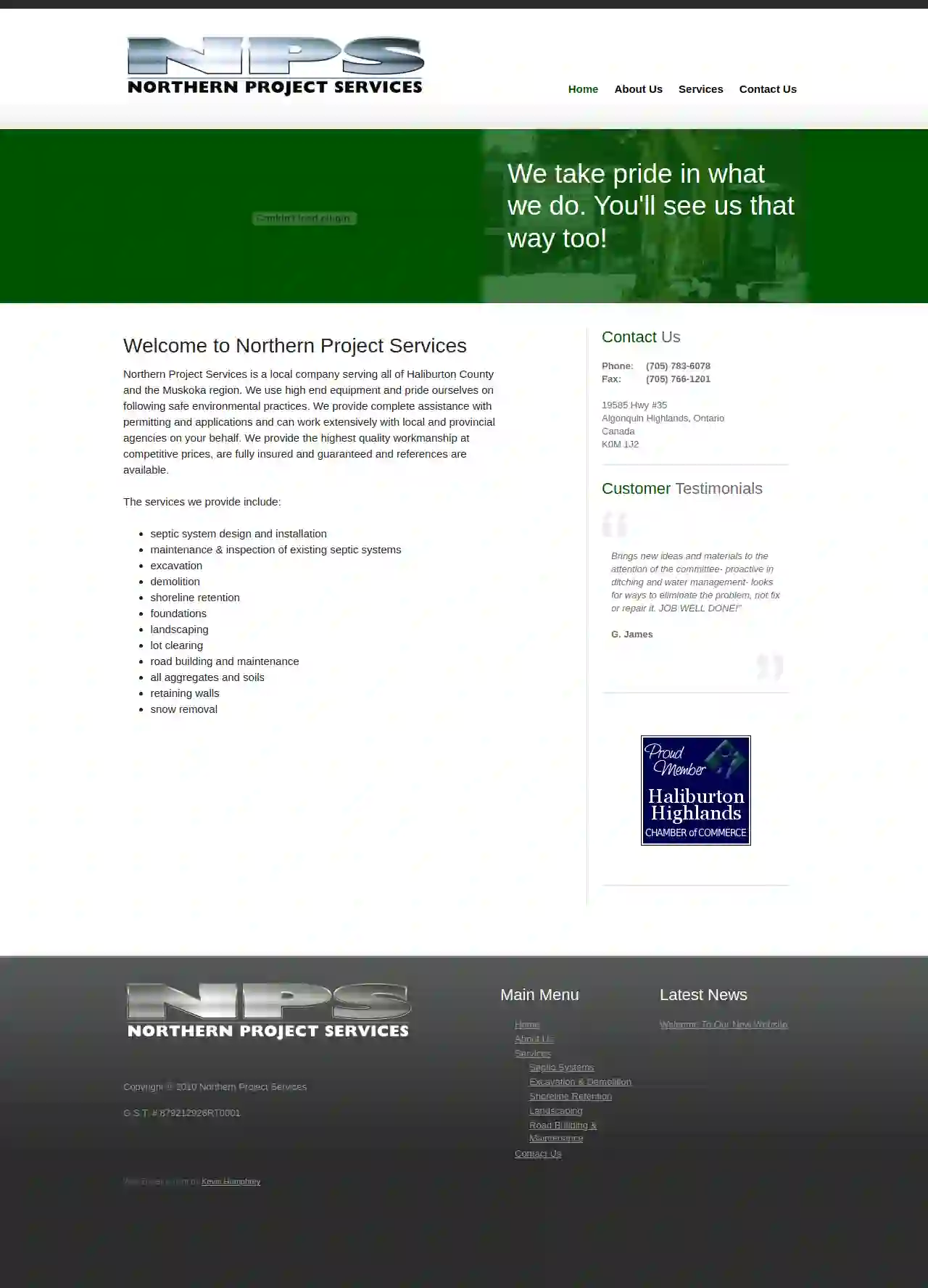
Northern Project Services Inc.
4.37 reviews19585 Hwy #35, Algonquin Highlands, K0M 1J2, GBWelcome to Northern Project Services Northern Project Services is a local company serving all of Haliburton County and the Muskoka region. We use high-end equipment and pride ourselves on following safe environmental practices. We provide complete assistance with permitting and applications and can work extensively with local and provincial agencies on your behalf. We provide the highest quality workmanship at competitive prices, are fully insured and guaranteed, and references are available.
- Services
- Why Us?
- Testimonials
- Gallery
Get Quote
Constructions Solutions Ltd
51 reviews93 Palmerston Road, Boscombe, Bournemouth, 93 Palmerston Road Boscombe, BH1 4HP, GBConstructions Solutions LTD: Building Your Dreams, One Project at a Time When Jimmy Plisi established Constructions Solutions LTD, he brought over two decades of extensive experience in the construction industry. Committed to delivering quality, transparency, competitive pricing, and peace of mind for every client, whether commercial or domestic, Constructions Solutions has steadily expanded its portfolio. This portfolio now showcases a diverse range of projects, from new builds and extensions to conversions, spanning Keynsham, Saltford, Bristol, Bath, and the south west, handling projects up to £20 million. Regardless of the scale, from simple home renovations to major new build developments, Constructions Solutions caters to all building needs within any budget.
- Services
- Why Us?
- Gallery
Get Quote
Resin Colour Stone Ltd
51 reviews40 Owain Glyndwr, Kinmel Bay, Rhyl, LL18 5FE, GBWelcome to Resin Colour Stone Ltd, your trusted driveway contractor in Cheshire and surrounding areas. We are a family-run business with over 30 years of experience delivering exceptional paving and driveway solutions. Our seasoned professionals are fully trained and qualified to bring your vision to life with precision and professionalism. We specialize in resin colour stone surfacing, block paving, Tarmac installations, and concreting. With a keen eye for detail, we can transform various domestic and commercial outdoor spaces ranging from driveways, patios, and paths to car parking, forecourts, and leisure areas. If you are looking for a cost-effective and durable paving solution, resin-bound surfacing is the right choice. Contact us to learn more.
- Services
- Why Us?
- Testimonials
- Gallery
Get Quote
Over 13,059+ Excavation Businesses registered
Our excavation experts operate in Eccleshall and surrounding areas!
ExcavationHQ has curated and vetted the Best Excavation Pros in Eccleshall. Find a top & trustworthy contractor today.
Frequently Asked Questions About Demolition Contractors
- Size and Complexity of the Structure: Larger and more complex structures, such as multi-story buildings, require more time, labor, and specialized equipment, increasing costs.
- Type of Demolition: Different demolition methods, such as implosion, wrecking ball, or high-reach demolition, have varying costs.
- Material Disposal: Disposal fees for demolition debris can contribute significantly to the overall cost, depending on the type and quantity of materials.
- Location and Accessibility: Demolition in densely populated areas or with limited access may require more planning and specialized equipment, affecting costs.
- Hazardous Materials: The presence of asbestos, lead paint, or other hazardous materials requires specialized removal and disposal procedures, adding to the expenses.
- General Liability Insurance: Covers bodily injury or property damage to third parties caused by the contractor's negligence.
- Workers' Compensation Insurance: Provides benefits to workers injured on the job.
- Pollution Liability Insurance: Covers costs associated with environmental contamination caused by demolition activities.
- Professional Liability Insurance: Protects against claims of negligence or errors in professional services, such as demolition planning or consulting.
- Waste Generation: Demolition generates a large volume of debris, contributing to landfill space and potentially releasing harmful substances into the environment if not disposed of properly.
- Air Pollution: Dust and particulate matter released during demolition can impact air quality, affecting human health and the environment.
- Noise Pollution: Demolition activities can generate significant noise, disturbing nearby residents and wildlife.
- Resource Depletion: Demolition consumes resources that could be salvaged and reused, contributing to resource depletion and environmental degradation.
- Size and Type of Structure: The method should be suitable for the structure's size, height, and construction materials.
- Site Location and Accessibility: The method should be feasible given the site's location, surrounding buildings, and access constraints.
- Environmental Considerations: Prioritize methods that minimize environmental impact, such as deconstruction or selective demolition if feasible.
- Budget: Different demolition methods have varying costs, so choose one that fits your budget.
- Safety: Prioritize methods that ensure worker safety and minimize risks to surrounding areas.
How much does demolition cost in the UK?
What is the importance of insurance in demolition projects?
What are the environmental impacts of demolition?
How do I choose the right demolition method for my project?
How much does demolition cost in the UK?
- Size and Complexity of the Structure: Larger and more complex structures, such as multi-story buildings, require more time, labor, and specialized equipment, increasing costs.
- Type of Demolition: Different demolition methods, such as implosion, wrecking ball, or high-reach demolition, have varying costs.
- Material Disposal: Disposal fees for demolition debris can contribute significantly to the overall cost, depending on the type and quantity of materials.
- Location and Accessibility: Demolition in densely populated areas or with limited access may require more planning and specialized equipment, affecting costs.
- Hazardous Materials: The presence of asbestos, lead paint, or other hazardous materials requires specialized removal and disposal procedures, adding to the expenses.
What is the importance of insurance in demolition projects?
- General Liability Insurance: Covers bodily injury or property damage to third parties caused by the contractor's negligence.
- Workers' Compensation Insurance: Provides benefits to workers injured on the job.
- Pollution Liability Insurance: Covers costs associated with environmental contamination caused by demolition activities.
- Professional Liability Insurance: Protects against claims of negligence or errors in professional services, such as demolition planning or consulting.
What are the environmental impacts of demolition?
- Waste Generation: Demolition generates a large volume of debris, contributing to landfill space and potentially releasing harmful substances into the environment if not disposed of properly.
- Air Pollution: Dust and particulate matter released during demolition can impact air quality, affecting human health and the environment.
- Noise Pollution: Demolition activities can generate significant noise, disturbing nearby residents and wildlife.
- Resource Depletion: Demolition consumes resources that could be salvaged and reused, contributing to resource depletion and environmental degradation.
How do I choose the right demolition method for my project?
- Size and Type of Structure: The method should be suitable for the structure's size, height, and construction materials.
- Site Location and Accessibility: The method should be feasible given the site's location, surrounding buildings, and access constraints.
- Environmental Considerations: Prioritize methods that minimize environmental impact, such as deconstruction or selective demolition if feasible.
- Budget: Different demolition methods have varying costs, so choose one that fits your budget.
- Safety: Prioritize methods that ensure worker safety and minimize risks to surrounding areas.